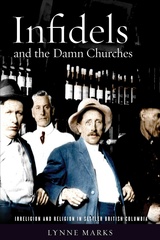
Westward Bound
Sex, Violence, the Law, and the Making of a Settler Society
In the late nineteenth century, European expansionism found one of its last homes in the North American West. While the settlement of the American West was renowned for its lawlessness, the Canadian Prairies enjoyed a tamer reputation symbolized by the Mountie and his legendary triumph over chaos.
Westward Bound debunks the myth of Canada’s peaceful West and the masculine conceptions of law and violence upon which it rests by shifting the focus from Mounties and whisky traders to criminal cases involving women between 1886 and 1940, where offences ranged from rape and wife-beating to husband murder and prostitution. In doing so, Erickson opens a window onto a world where judges’ and juries’ responses to the most intimate or violent acts were coloured by a desire to shore up the liberal economic order by maintaining boundaries between men and women, Native people and newcomers, and capital and labour. Victims and accused could only hope to harness entrenched ideas about masculinity, femininity, race, and class in their favour. The results, Erickson shows, were predictable but never certain.
This fascinating exploration of hegemony and resistance in key contact zones not only complicates traditional narratives of prairie exceptionalism, it also draws the region’s history into larger debates about law, colonialism, and nation building. This book will be welcomed by social and legal historians, those with an interest in colonial and frontier history, as well as scholars and students of law and gender.
This book will be welcomed by social and legal historians, those with an interest in colonial and frontier history, as well as scholars and students of law and gender.
Awards
- 2012, Commended - Canadian Law & Society Association Book Prize
Fascinating ... Erickson’s substantive incorporation of elements beyond the text, including courthouse architecture, prairie visual culture, and police photography, also enliven her discussion of legal and sociocultural developments ... scholars of western Canadian legal, sex-trade, and cultural history will find this book a valuable and engaging addition to both teaching and research.
This exploration of hegemony and resistance debunks the myth of Canada's peaceful settlement of the West.
An important and groundbreaking effort that re-centres attention on prairie history as a place where profound legal historical questions were examined and articulated ... Erickson’s work has the potential to trigger a renaissance in prairie legal history.
By comparing and contrasting various areas of law, this book makes new links between race, gender, and class that are missing in works with a narrower focus ... An important contribution to existing literature.
Foreword
Introduction
1 Fruitful Land, Happy Homes, Manly Titans: Settlement Frontiers, Law, and the Intimate in Colonialism and Nation Building
2 They Know No Better: Maintaining Race and Managing Domestic Space at the Fringes of Civilization
3 The Most Public of Private Women: Prostitutes, Reformers, and Police Courts
4 The Farmer, the Pioneer Woman, and the Hired Hand: Sexual Violence, Seduction, and the Boundaries of Class
5 For Family, Nation, and Empire: Policing Drugs, Abortion, and Heterosexuality in the Interwar City
6 The Might of a Good Strong Hand: Domestic Violence, Wife Murder, and Incest
7 She Is to Be Pitied, Not Punished: The Murderess, the Woman Question, and the Capital Punishment Debate
Conclusion
Notes
Bibliography
Index












